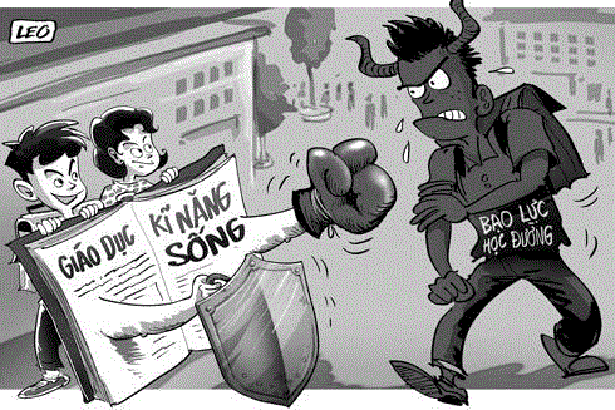Managing student misbehavior in the school environment requires a flexible combination of empathy, understanding, and positive discipline.
 |
| MSc. Pham Thi Khanh Ly believes that managing students' deviant behavior should involve a combination of understanding, empathy, and positive discipline. (Photo: NVCC) |
That is the opinion of MSc. Pham Thi Khanh Ly, Vice President of the School Board/Executive Director of FPT Cau Giay Primary and Secondary School (Hanoi)/FPT Bac Giang Primary, Secondary and High School, regarding the current situation of deviations in behavior and lifestyle of a part of young people today.
Can you share your views on deviant behavior among students today, especially in the school environment?
Every human behavior requires certain principles, for each individual at each time, each situation, there needs to be appropriate behavior. In the school environment, in my opinion, students need to practice positive and appropriate behavior.
Deviant behavior is behavior that does not conform to moral or social norms, school rules, or legal regulations. In students, this behavior often reflects personal or family problems and their social connections.
Rather than simply viewing the behavior as a misbehavior and dealing with it as a disciplinary violation, it should be viewed as a signal of the student's difficulties, dissatisfaction, or psychological imbalance.
Therefore, managing student deviant behavior in the school environment requires a flexible combination of empathy, understanding, and positive disciplinary measures.
In your opinion, what behaviors are considered deviant in the current school environment? What are the causes of this situation?
In today's school environment, schools are constantly faced with the problem of students not following expected behavioral patterns.
According to many studies, deviant behavior of students in the school environment can be divided into groups such as deviant behavior in studying (skipping class, cheating, not completing assignments); deviant behavior in communication (lying, being rude, swearing); deviant behavior in using addictive substances (smoking, drinking alcohol, using stimulants); deviant behavior in social order (fighting - brawling, watching obscene cultural products, violating traffic laws).
| “Understanding deviant behavior must go hand in hand with understanding the surrounding systems that impact students.” |
Deviant behaviors in learning and communication are more common among students. In particular, deviant behaviors in technology applications, on social networks containing a lot of information that is addictive to teenagers, who are at the age of curiosity, love to explore, do not know how to control themselves, and are easily attracted and enticed. There are many reasons leading to such behaviors.
Subjectively, students may not fully perceive or misunderstand the rules, lack awareness or do not want to comply with the rules because they think they are unnecessary or too strict, or it may be due to friends, family education influences, or psychological factors of adolescence.
Students do not naturally begin to engage in deviant behavior, but rather learn how to do so from others. This “learning” occurs within their immediate groups. Intimate groups such as family, close friends, and classmates have the greatest influence on students’ behavior and attitudes, followed by community groups and social organizations. Therefore, understanding deviant behavior must go hand in hand with understanding the systems that surround and influence students.
Objectively, deviant behavior may stem from school regulations that have not kept up with the changes of modern society. Lax management mechanisms and lack of attention are also reasons why students do not voluntarily comply.
In addition, many regulations are issued without consulting students, or students are influenced by negative factors from life, friends and inappropriate educational methods from family and teachers.
So what do you think schools should do to help students avoid deviant behavior?
The school not only teaches letters but also focuses on building moral and lifestyle education content suitable for each grade and level.
Moral issues cannot be taught in theory, contained in lectures, but require a long-term training process. In addition, there needs to be skillful, flexible, and regular coordination between teachers and parents to strengthen the connection between school and family, improve the effectiveness of education, and guide students to standard behaviors.
The “role model” factor is very important in educating and guiding students to maintain a healthy lifestyle and avoid deviant behavior. Accordingly, each teacher and staff member in the school needs to be a good example for their students.
The Ministry of Education and Training has issued Circular 08/2023/TT-BGDDT, which stipulates that teachers at all levels must regularly cultivate ethics, uphold a sense of responsibility, preserve the qualities, honor and prestige of teachers; be exemplary in front of students; love, treat fairly and respect students; protect the legitimate rights and interests of students; unite and help colleagues; strictly implement regulations on common responsibilities and obligations of civil servants and the Ministry's regulations on teachers' ethics.
 |
| Schools not only teach letters but also need to focus on building moral and lifestyle education content. (Illustration: Internet) |
What programs and activities should be implemented in schools to help children develop comprehensively and healthily?
Schools should establish a code of conduct, which clearly defines what is allowed and what is not allowed for students to understand and comply with. Educating students to develop comprehensively and healthily cannot lack extracurricular activities that enhance life skills, community-oriented activities, volunteering, and promoting the values of humanity and compassion.
It is necessary to implement a large-scale prevention program, including popularizing regulations and ethical standards in the educational environment along with a code of conduct. At the same time, educating about lifestyle ethics aims to raise awareness to prevent deviant behaviors such as the use of electronic cigarettes and banned substances, school violence, and traffic violations.
Through seminars and talks on mental health, promptly support problems arising in students' psychological development.
In addition to education and support on a large scale, students with deviant behavior need to be accompanied 1-1, privately discussed by teachers as well as considered for psychological support by the school psychology department. Why is that? Because each teacher is not simply a person who imparts knowledge but also a person who cultivates the soul. To help these students, teachers need to combine many methods effectively.
First of all, loving the profession and loving children is the core that helps teachers persevere to overcome challenges in education. At the same time, teachers need to manage emotions well and always be patient, because the process of change in students often does not happen immediately.
Furthermore, understanding the psychology and circumstances of students is also very important, because this allows teachers to come up with appropriate educational measures, based on the causes of deviant behavior. Sincere concern and a non-discriminatory attitude help teachers easily connect with students, helping them feel loved and not alienated.
In addition, teachers should praise the strengths before reminding students of the weaknesses so that students can easily accept and not have a defensive reaction. In particular, teachers need to believe in the changes of students, not be hasty and always create opportunities for them to correct.
Finally, the combination of flexible methods, loving discipline and close cooperation between school, family and society creates a comprehensive supportive environment, helping students gradually improve themselves.
What are some specific examples of students with deviant behavior that you have encountered and how you resolved them?
With students lacking motivation to study, often not studying or doing homework, leading to poor grades and the risk of being held back, teachers should proactively meet with students, understand their difficulties and share their goals and ways to be motivated in studying.
For students with violent behavior, they often get angry, hit their friends, and resolve conflicts with violence. At this time, teachers should meet with students and give clear rules about school discipline so that they understand the need to comply with discipline.
I think it is important to encourage students to understand the emotional difficulties that lead to their deviant behaviors. At the same time, psychological workshops should be organized so that students understand friendship and the role of friendship, avoid unnecessary conflicts that lead to violence with friends, and how to resolve conflicts peacefully and amicably.
Thank you!
Source: https://baoquocte.vn/ky-luat-tich-cuc-de-giam-hanh-vi-lech-chuan-cua-hoc-sinh-289642.html




![[Photo] Overcoming all difficulties, speeding up construction progress of Hoa Binh Hydropower Plant Expansion Project](https://vstatic.vietnam.vn/vietnam/resource/IMAGE/2025/4/12/bff04b551e98484c84d74c8faa3526e0)



























































































Comment (0)